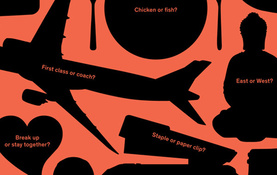
urbansheep@gmail.com
Do You Suffer From Decision Fatigue? - NYTimes.com (спасибо http://friendfeed.com/payalni...) - http://www.nytimes.com/2011...

|
2 сентября 2011 в 13:25 с Bookmarklet
пепетяка
пойду-ка я поработаю
тоже шаман, но другой
Prometa
вприпрыжку с кладбища
“The cumulative effect of these temptations and decisions isn’t intuitively obvious. Virtually no one has a gut-level sense of just how tiring it is to decide. Big decisions, small decisions, they all add up. Choosing what to have for breakfast, where to go on vacation, whom to hire, how much to spend — these all deplete willpower, and there’s no telltale symptom of when that willpower is low. It’s not like getting winded or hitting the wall during a marathon. Ego depletion manifests itself not as one feeling but rather as a propensity to experience everything more intensely. When the brain’s regulatory powers weaken, frustrations seem more irritating than usual. Impulses to eat, drink, spend and say stupid things feel more powerful (and alcohol causes self-control to decline further). Like those dogs in the experiment, ego-depleted humans become more likely to get into needless fights over turf. In making decisions, they take illogical shortcuts and tend to favor short-term gains and delayed costs. Like the depleted parole judges, they become inclined to take the safer, easier option even when that option hurts someone else.
¶ “Good decision making is not a trait of the person, in the sense that it’s always there,” Baumeister says. “It’s a state that fluctuates.” His studies show that people with the best self-control are the ones who structure their lives so as to conserve willpower. They don’t schedule endless back-to-back meetings. They avoid temptations like all-you-can-eat buffets, and they establish habits that eliminate the mental effort of making choices. Instead of deciding every morning whether or not to force themselves to exercise, they set up regular appointments to work out with a friend. Instead of counting on willpower to remain robust all day, they conserve it so that it’s available for emergencies and important decisions.” #схватил_за_мозг - × × ×
Надпись на визитке: ego-depleted human. - × × ×
© 2015 FriendFeed (and Clio archiver)